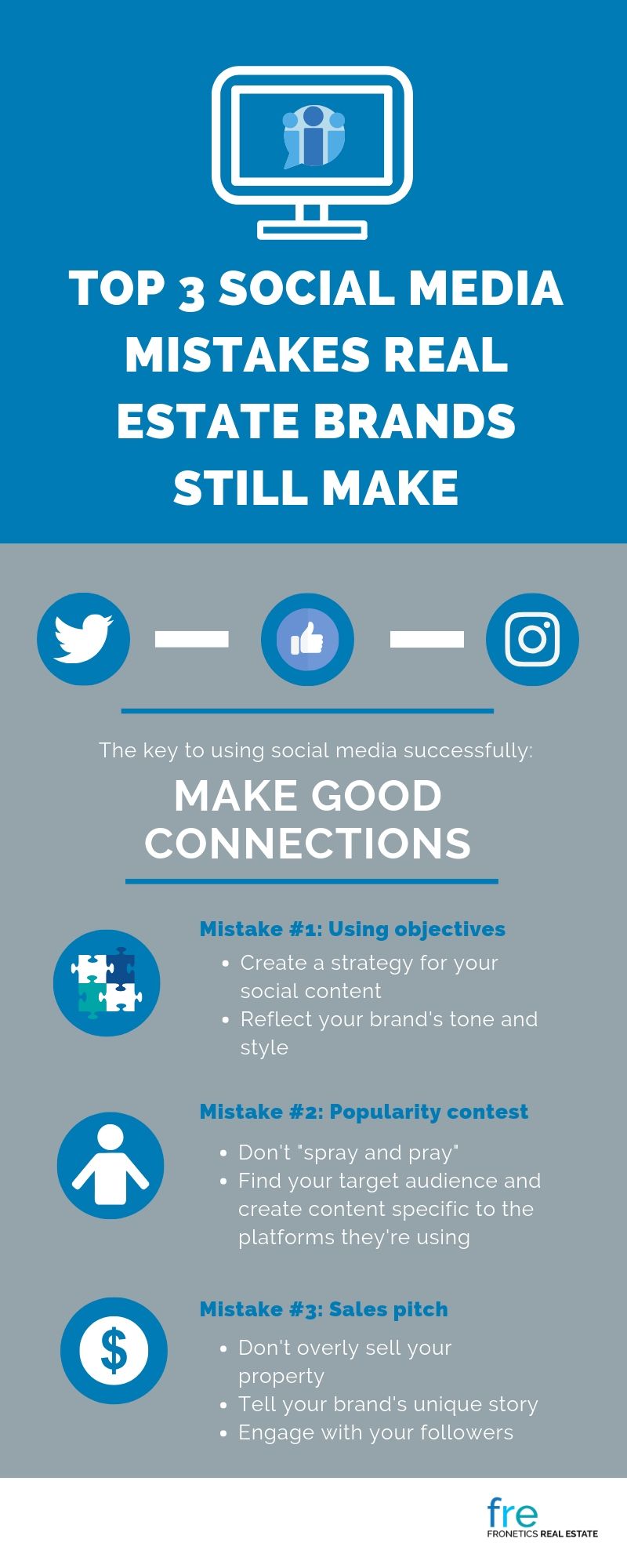Your search results for "Measuring success"

Marketing Real Estate on Social Media: 8 Best Ways to Get More Leads
How do you gain maximum exposure for your luxury brand? Here are 8 tips to boost your real estate social media strategy.
Did you know that 91% of marketers are looking for the best ways to engage their audience on social media? Real estate is a very competitive yet lucrative field, a fact that demands a real estate social media strategy. But only those who know how to utilize the best tools and strategies get results.
When it comes to shifting properties, the game is on another level. Local developers are moving towards visually appealing homes complete with a wide range of wellness amenities — and they let it all shine as part of their real estate social media strategy.
To move towards a positive step in luxury development, successful real estate marketers are using social media as the go-to strategy to get high quality leads. Want to know how to boost your real estate marketing game using social media?
Here are our top tips on how you can make your real estate social media strategy a success.
1. Have a unique social media profile
Do you think it is enough to open a social media account for your real estate company and fill the profile details in a hurry? Of course not. You need to optimize your profile and ensure it stands outs from the rest. You’d be surprised to find out that 79% of the people in the United States have a social media profile. So, while you will need to add relevant information related to your business, such as contact details and address, fill out the story section to make it clear which services you are offering.
2. Share luxury development content for local people
A vast number of people who will view your properties will most likely come from the same area where your real estate company is located. Therefore, it makes sense to focus on posting local content that will drive the locals to your social media platforms. Apart from posting content, you can also target local people by sharing local news, information related to the prices of local properties, and local events your company will be sponsoring. Make sure to share photos that are geotagged.
3. Add videos on your social media pages
YouTube is one of the top search engines for videos. In fact, 86% of home shoppers prefer to use video to get more information about properties. Besides, 52% of marketing professionals agree that video content tends to have the best return on investment (ROI). Uploading a video on social media could be the difference between a home buyer choosing your company or that of your competitor.
4. Use reviews to promote faster sales
Social media provides a platform for consumers to tell their truth about a specific service or products which then motivates other potential customers to take decisive action. Also, 62% of potential home buyers would go for a real estate company that was found online and had excellent reviews. To connect with your customers, share their success story, testimonials, or review on social media. You can even go further and offer an incentive to motivate people to leave a review.
5. Add hashtags to your content
Users on social media are looking to make a personal connection with the people behind the real estate marketing and not automated machines. Create social media content in advance to avoid last-minute rush and add hashtags that clearly shows how your luxury development is unique.
6. Engage with your followers to increase brand awareness
One of the best ways to attract internet users to your real estate company is to educate them and offer free advice. Posting information related to property listing at all times will make you look promotional. You can quickly build your brand and connect with people by giving them beneficial advice, such as the latest real estate marketing trends 2019. That way, people will view you as an expert in the industry and contact you for any inquiries.
7. Find local online communities
While Facebook is a great platform for finding and connecting with local communities, Instagram is one the fastest growing social media platforms with over 1 billion active users. You can use both platforms to build a community and start creating content for them.
8. Make use of Pinterest
People are likely to be more attracted to property listings with high-quality images. In fact, 87% of home buyers find photos of properties very useful in making an informed decision. Apart from social media, you can use Pinterest to pin visually appealing images to popular boards related to real estate.
What do you think will be the most important part of your real estate social media strategy?
Would you like someone else to do the job? We are here to help.
Related posts:
- 10 Social Media Statistics for Real Estate Marketers 2018
- Should I Be Using Facebook Carousel Ads?
- How to Use Social Media Hashtags in Real Estate Marketing
Your search results for "Measuring success"

Drive More Traffic and Generate More Leads with Your Real Estate Blog with our Editorial Calendar Template
Our Editorial Calendar Template will hold you accountable to your content strategy.
Having a documented strategy is critical for content marketing success. An important extension of that idea is making sure your blog content is well-organized and aligns closely with your content strategy.
We have created a blog editorial calendar template to help you organize and improve your real estate content marketing efforts. This template is designed to keep you on track as you develop content that will attract and engage your prospects and customers. It will help you map out your content in a strategic manner, maximize productivity, and keep you organized. It includes weekly and monthly worksheets, as well as an ideas worksheet for tracking blog post ideas.
Why do you need an editorial calendar?
Having an editorial calendar gives structure to your blogging efforts. It’s a commitment to your potential investors, and gives you built-in accountability for your overall real estate marketing strategy.
The editorial calendar is a dynamic, internal document that will help your team determine what activities you’ll focus on, and when they’ll be completed. This enables you to optimize how you connect and engage potential buyers and tenants with your blog content.
Organized week-by-week, an editorial calendar makes it easy to visualize your marketing strategy, ensuring consistently scheduled blog posts and a diversity of topics.
Beyond scheduling blog posts, the use of an editorial calendar keeps other essential considerations front of mind. By including related information — such as keyword assignments, target persona(s), and associated promotions or calls-to-action — will make your editorial calendar an indispensable guide to your blogging success.
We’ve created this template to guide your blogging efforts. Designed to keep you on track as you develop content that will attract and engage potential buyers and renters, our free template will help you map out your content in a strategic manner, maximize productivity, and keep you organized.
Download the free resource below.

Your search results for "Measuring success"

5 Marketing Automation Ideas for Real Estate
Real estate marketers using marketing automation can save time and money while increasing leads, conversions, and overall marketing success.
One of the biggest marketing trends this year is automation. HubSpot recently reported that businesses using marketing automation to nurture leads received a whopping 451% increase in qualified leads. So how can real estate marketing professionals reap these benefits while saving time and money on their efforts?
If you’re using it right, marketing automation software can deliver real-time, personalized messages to prospective buyers and renters at every step of the lead-generation process. You can tailor custom email messages based on indicated interests, streamline social media efforts with scheduled posts, evaluate the success of your efforts, and adjust your strategy accordingly.
Check out these five ways that marketing automation can help you sell real estate, with suggested tools for each idea.
5 marketing automation ideas for real estate
1) Social media
Keeping your posts on multiple platforms up to date, consistent, and engaging can be a major time drain. Automating your social media marketing efforts lets you plan ahead and schedule updates on some or all of your social media channels, and lets you easily strategize about peak posting times.
Suggested tool: Sprout Social
2) Email
Having a segmented email list — sorted by when someone joined the list, what emails they’ve opened, their demographics, etc. — is key. This way, you can ensure you’re sending the most relevant information to your prospects, keeping them invested (and keeping you out of their spam folder). Once you set up a template, plugging in your content is easy. You’re able to manage your contact list and schedule emails in advance.
Suggested tool: MailChimp
3) Text messages
There’s a good chance you’re reading this on your cell phone, and, if not, it’s probably close by. Savvy marketers are taking advantage of the ubiquitous nature of mobile devices and using texting to reach audiences with a short message that they’re highly likely to read.
Suggested tool: TextMarks
4) Direct mail
While any number of virtual marketing platforms are beneficial, direct mail is still a powerful tool for real estate. It can be highly time-consuming to manage direct mail campaigns and mailing lists, but automation software that lets you generate geographically or demographically targeted mailing lists can help you reach your ideal audience.
Suggested tool: TriggerMarketing
5) Lead generation and nurturing
Converting website visitors to leads is always the goal, but it often comes with a back-breaking load of time-consuming labor. The right software lets you move your prospect through the sales funnel automatically, sending emails to educate them on the next steps, and scheduling them for viewings.
Suggested tool: SmartZip
What marketing automation tools are you using in your real estate marketing?
Related posts:
- What Metrics Should You Track in Real Estate Marketing?
- Social Media Can Be a Strategic Weapon in Real Estate Marketing
- When Traditional Real Estate Marketing Methods Stop Working, Try Digital Marketing
Your search results for "Measuring success"

Infographic: Top 3 Social Media Mistakes Real Estate Brands Still Make
Social media is a valuable tool for real estate brands, but only if they use it to their best advantage and avoid these three common mistakes.
Highlights:
- Social media is one of the most effective ways to increase brand awareness and generate leads.
- All social media channels have a differentiating quality that makes them appealing to specific audiences. Don’t try to tackle every platform, focus on where your target audience is spending time.
- Real estate brands that succeed on social media are finding innovative and creative ways to engage and connect with their users.
91% of real estate professionals use social media. And we all understand why. By 2019, it is estimated that there will be around 2.77 billion social media users around the globe. That’s a lot of potential customers.
So it’s easy to understand why real estate brands are using social channels to boost their marketing efforts. Social media is an easy and effective way to increase your properties visibility and reach new audiences, but only if you use it correctly.
Top three social media mistakes real estate brands make
Mistake #1: Using objectives
Marketers need to use strategy to effectively utilize social channels. With the constant updates and changes to social platforms, real estate brands need to plan out content, frequency of posts, and pillar topics. Instead of posting with objectives in mind — like increasing leads — try to create posts that reflect your brand, follow your style guidelines, and reflect your brand’s tone.
A clear strategy can also help improve ROI. Almost two-thirds of marketers still struggle to prove their marketing efforts on social platforms are working. With a defined social media strategy, you can create specific goals, track and measure your efforts, and make changes when needed.
Mistake #2: Popularity contest
It’s easy to think that posting on all the most popular social channels is the best idea. Think again. Social media platforms have specific qualities that make them popular among audiences. Real estate marketers need to identify their target audience and find out what social channels they are using.
The next step is to create content that aligns with those platforms. As marketers, we know how easy it is to post the same content across all platforms. The success behind social media is authenticity and engagement, so it’s important your posts reflect this. Create content, like video, that caters to social channels to help build brand awareness and loyalty.
Mistake #3: Sales pitch
Being overly “salesy” will make prospects run – maybe right into your competition. The best way to win buyers on social media is through engagement. Content that helps prospective buyers envision themselves in your property is what will increase your organic reach. Create innovative and informative content that stands out on social channels by telling your brand’s story. This unique perspective will help create an emotional connection will have a long-lasting impact on viewers and drive brand loyalty.
Related posts:
- 5 Creative Ways to Use Instagram Stories for your Luxury Real Estate Brand
- Measure Social Media Success in Terms of Potential, not Dollar Amount
- How to Use Social Media Hashtags in Real Estate Marketing
Your search results for "Measuring success"

6 Signs It’s Time to Consider Outsourcing Your Real Estate Marketing
Take an honest assessment of these 6 areas to see if outsourcing your real estate marketing might be a smart move.
Real estate companies are increasingly open to outsourcing real estate management because it allows them to focus on their core competencies while improving effectiveness. So why not apply the same rationale to bolster your marketing efforts? Don’t be afraid to look outside the box for the marketing tools you need to succeed.
As your competitors’ marketing budgets continue to climb, your company needs expertise on your side to get the most out of your marketing dollars — and that’s especially true in the digital space. Content marketing can be very challenging for novices and seasoned marketers alike. Blogging, paid search and social advertising, email marketing, social media management: there’s a lot to juggle. That’s why many real estate15 companies are outsourcing some — or all — of their marketing programs.
Have you considered outsourcing as an option? Maybe it’s time you did. Parsing out certain projects on an as-needed basis to an outside firm can help you comfortably navigate and succeed in the marketing world.
6 signs you should outsource your real estate marketing
Assess your staff in these six areas to determine if it’s time to explore outsourcing your real estate marketing efforts.
1) “Wait, what’s going on with social media now?”
Do you feel like you are always reacting to marketing trends instead of planning for them? You need to be one step ahead of what’s coming, especially in fast-changing spaces like social media, in order to meet your customers where they are.
Learning best practices and new tools can be challenging, especially if you’re time strapped. Using an outside firm with expertise across the spectrum — and whose job depends on knowing the newest platforms and media — will give you an edge over competitors.
2) Everyone is at capacity.
Is your current marketing team able to take on new projects easily, without compromising existing responsibilities? If your staff has great ideas but not the resources to initiate them or follow through, you need to find a way to fix that.
Consider breaking off projects to an outside firm, even on a trial basis to test the waters. Plus if you outsource to experts, you won’t have to reinvent the wheel in-house or risk being off trend.
3) You lack time for proper strategizing and assessment.
Do you have a unified marketing strategy in place with a way to measure objectives and results? If you’re too busy keeping up with day-to-day work to step back and plan, then regularly assess how things are going, consider outsourcing.
Creating a strategy with short- and long-term goals is essential to marketing success. Using an agency to create a roadmap for you — and then to track progress — will free you up to focus on running your business. Also, an objective audit of your practices can be truly beneficial and will only improve your strategies.
3) You only have time to focus on one or two platforms/areas/ideas.
Are your marketing channels diversified? Your marketing reach needs to extend to all avenues, particularly in the digital world. Outsourcing SEO, paid search and social advertising, blogging and social media projects is a relatively easy task to manage and is absolutely essential for success in the current world.
4) You can’t afford another hire.
Are you on a tight budget? If your budget doesn’t allow for hiring and training key staff, outsourcing your marketing needs is a way to grow your reach and accomplish your goals without generating overhead such as training costs, benefits or payroll expenses. It’s also a way to try out new projects and programs to see if they stick.
5) You don’t have time for professional development.
Is there a skill set you and your employees want to advance? Gauge the temperature of your existing staff to ensure everyone’s needs are being met. Retaining top talent isn’t easy, so keep in mind that you don’t want existing employees to be concerned about their job security.
Identity each in-house staff member’s strengths and interests, and cultivate them. Strengthen what you have but look to complete your marketing toolkit with the available expertise.
Related posts:
- When Traditional Real Estate Marketing Methods Stop Working, Try Digital Marketing
- 5 Tips for Building a Successful Real Estate Social Media Marketing Program
- Using Content Marketing to Market and Sell Luxury Real Estate




